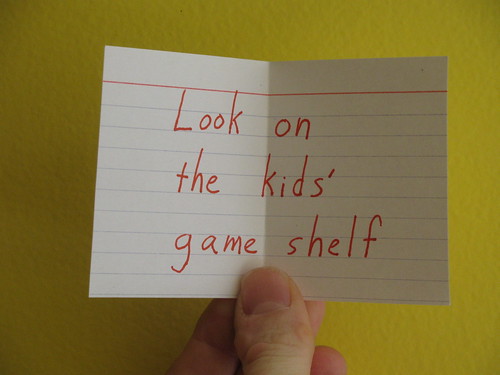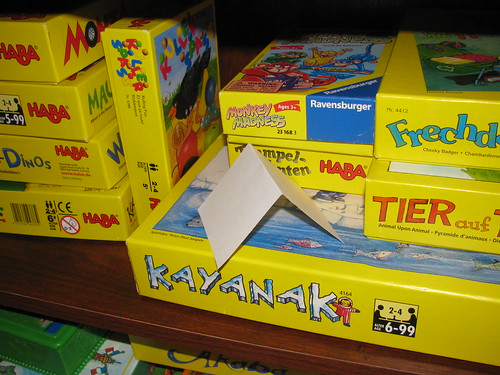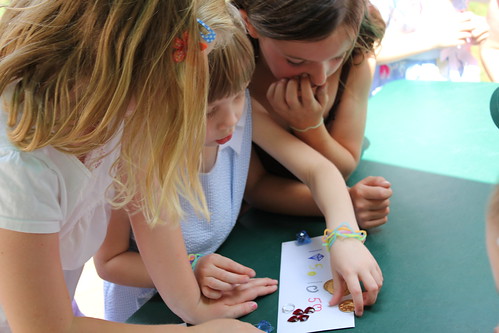This past winter, at the suggestion of David Saff, I started creating "treasure hunts" for my kids, partially as an activity to enhance reading vocabulary, but mostly for fun. The hunts take the form of a bunch of index cards on which I write a clue, like so:

Finally, at the end of the hunt they find a "treasure", which for us is just a poker chip which they then put in their treasure bag which acts as a log of all the hunts they've done. A white poker chip is at the end of a short 5-clue hunt, a red at the end of a 8-clue hunt, a blue at the end of a 12-clue hunt and a gold chip at the end of a 18-clue hunt. At this point I've got a stack of 50+ clues which are more or less complete composable into new hunts, meaning that it's easy to set-up a new hunt by hiding clues relatively quickly and soon the kids are off to the races. These treasure hunts have been a rousing success, with some of the clues getting a star on them, indicating they are suitable for reading by my son, who's not quite reading age yet. I highly recommend these hunts to any parent with children around age 5 or 6.
As they got better at the basic hunts, I added more complex clues, including fill-in-the-blank clues and dictionary clues. The fill-in-the-blank clues look like this:
So, under the couch they might find the word "behind" and on the red chair they might find the phrase "the TV", and the next instruction would be found behind the TV. For dictionary clues, they would be given a dictionary of nonsense words at the beginning of the hunt and the clue would be of the form "Look flurb the siddy boff." and they'd have to decode the clue with the dictionary.
So, for Genevieve's 6th birthday party, I decided to have an elaborate multi-stage treasure hunt. The goal of the hunt was to rescue/find 4 fairies hidden around the yard. But, in order to find the fairies, you needed to follow clues on treasure hunts, like the ones I described. But, in order to get the first clue for each treasure hunt, the kids needed to "buy" the clue with treasures. In order to get the treasures, they had to go on "Quests" and complete "Challenges" which were essentially various little backyard birthday party games. A kid would complete a Quest and they'd get treasure, like "1 silver ring and 2 red hearts" and another would complete a Challenge and get "2 gold coins and a blue gem", etc. Then to buy the clues they'd have some large combination price like "1 blue gem, 5 gold coins, 1 silver ring, 5 red hearts", like so:
During the course of the individual fairy treasure hunts, some of the individual clues, rather than specifying a location, would say "Bring 1 gold coin, 1 blue gem and 1 silver ring to the Royal Court." (The Royal Court was the grownups) meaning they'd have to see if they had enough resources or they'd do more challenges/quests.
As the party approached and I explained the plan to family & friends, I got a lot of raised eyebrows expressing skepticism as to whether the whole thing was a bit complex for 6-year-olds. The party came and it was an outstanding success; the kids understood it without difficulty and had an absolute blast. I highly recommend it.


